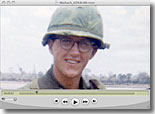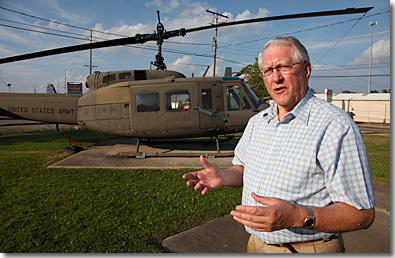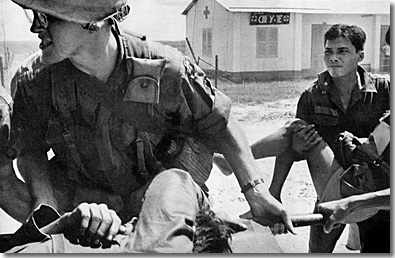|
In LOOK's 1967 Christmas issue, the editors provided millions of readers with a melancholy and conflicted view of the world – the beauty of the Holy Land, the desperate life of hunger for Teresa Pilgrim's family in Mississippi, and the terror and courage of a young "Pacifist on the Killing Ground" of Vietnam.
Gary Maibach was that non-combatant medic. He was, and still is, a member and lay minister of the Apostolic Christian Church of America which has a tradition of serving as non-combatant medics.
"I believe that, certainly, the taking of life is not according to the Scripture," he says. But Maibach became devoted to and accepted by his Army unit – the 9th Infantry, 4th Battalion, 47th Infantry. "We had wonderful discussions when I first came into the unit." The guys would spin out hypothetical situations where Maibach would have to kill an enemy or allow his men to be killed by the Viet Cong. "I said I could not do that because at that point I become judge and jury. I feel that I am ready to meet my maker. I am at peace with God and man. Jesus is my Savior. But I don't know about that guy coming at me out there. I don't feel I can make that unilateral decision [to kill him]. And realistically, they never pushed it beyond that," he remembers.
The most intense combat Maibach's unit faced happened on June 19, 1967, southeast of Saigon. They were ambushed by a large force of North Vietnamese regular Army soldiers. Within minutes, the first two companies in the fight had lost their medics. "So, what do you do when they say, 'Medic!'?" he remembers. "It was 100 or more yards to the front. And I got up and started running, at which point, I rather clearly remember being tackled. I don't know who tackled me, but the lieutenant says, 'You're not going up there without a fire team.' So he got a fire team – a sergeant and three riflemen – to go with me."
"My recollection of that day is very, very indistinct." Maibach admits. "Different people have told me that that's my mind trying to protect me. But there are some things that are in crystal clarity."
|

|
He remembers bullets whizzing overhead. He remembers the lieutenant he first tried to help dying within a few seconds. He remembers loading wounded soldiers onto the first medical evacuation helicopter. "I get about the third guy in. The door gunner, for whatever reason he hadn't been firing, he opens up right then. I thought that was it! Because he's right over my head with an M-60. And about that time, the Viet Cong were able to hit the tail rotor with a large round and blew it out."
The chopper came within inches of crushing Maibach. The pilot, co-pilot and door gunner were now wounded. Another helicopter was called in. More wounded were loaded. And that helicopter was shot down. Finally, a third Huey was able to the wounded out, the unit was pulled back and artillery, gunships and jets pounded the enemy and suppressed their fire. He survived.
Today, Gary Maibach is back in his home town of Sterling Ohio. "Not much has changed in Sterling Ohio since 1967," he admits. But, he says all he ever wanted in Vietnam was to come home and work in his family's furniture business. He did, and it was successful. About 10 years ago, Maibach and his family moved the store to a strip mall in the larger town of Medina. He and his wife Mary have four children and 12 grandchildren.
He says he doesn't like the label "Pacifist" because it's associated with protestors who didn't honor his service and those of his comrades. But Maibach told how some of the guys in his unit went back to Vietnam and talked with some of the Viet Cong soldiers who fought against them in the June 1967 battle. They quoted one of the soldiers saying, "When old men can't get along, they send their sons out to kill each other."
"Pretty profound," he now says. "I mean, isn't that what war is? … I do not try to justify war. But I realize that it's like a lot of other things. It's an evil that exists in our world because of sin."
Gary died in June, 2024, at the age of 79.
|







